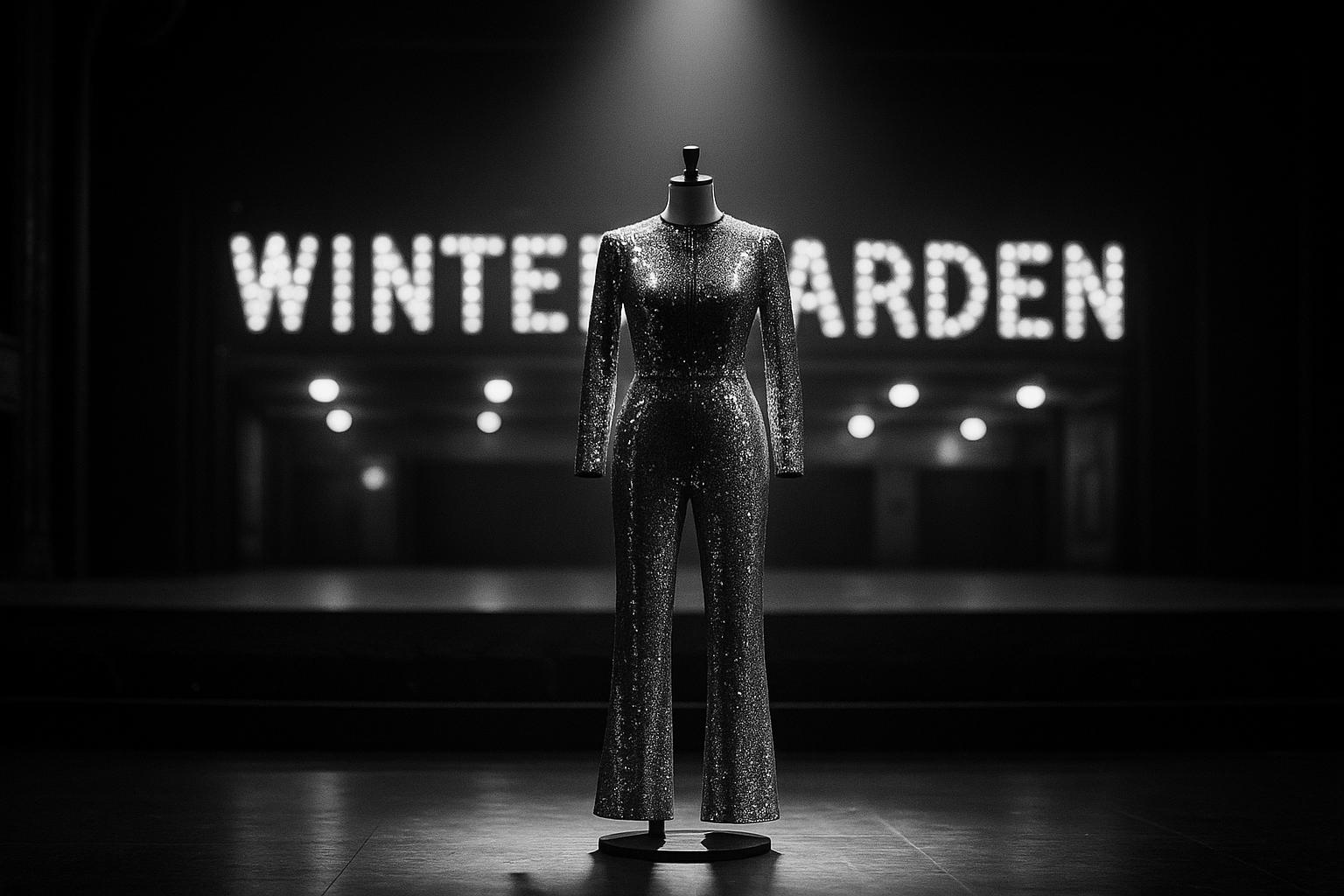Neon jumpsuits and ABBA hits are back as Mamma Mia! reopens at the Winter Garden Theatre for a strictly limited six‑month Broadway engagement through 1 February 2026. The production largely transfers from the 25th‑anniversary North American tour — with Amy Weaver as Sophie, Christine Sherrill as Donna and 25 company members making their Broadway debuts — and tickets are being handled via Telecharge.
Neon-coloured jumpsuits, sequins and an infectious ABBA soundtrack have returned to the stage where it all began: Mamma Mia! has officially reopened on Broadway in its original home, the Winter Garden Theatre, for a strictly limited six‑month engagement that runs through 1 February 2026. The current company largely transfers from the 25th‑anniversary North American tour, with Amy Weaver stepping into the role of Sophie and Christine Sherrill as Donna; producers say 25 members of the company are making their Broadway debuts. According to the production’s official site and press coverage, tickets are being handled through Telecharge with group‑booking and box‑office information available for audiences planning visits.
The musical’s return leans on precisely the mix of spectacle and sentimentality that has sustained it for more than a quarter of a century: a jukebox format built around ABBA’s hits, buoyant choreography and a focus on female friendship at its heart. Industry features have traced why the show continues to resonate, arguing that its blend of nostalgia, crowd‑pleasing score and an emotional centre — the friendship of Donna and her “dynamos” and the mother‑daughter relationship with Sophie — helps it bridge generations of theatre‑goers.
Members of the cast say that generational affection for the story remains a powerful draw. “I grew up on the movie,” Amy Weaver told The Independent shortly before making her Broadway debut, adding that she watched the film “when I wanted to be re‑inspired about life in general.” Speaking to the same publication, Weaver also highlighted the show’s depiction of unapologetic, outspoken women: “Sometimes it doesn’t come out pretty and it doesn’t come out exactly the way you planned… but I think it’s better to just have it come out in that they’re also speaking up for themselves.” Catherine Johnson, who wrote the book, told The Independent that after the shock of 11 September 2001 people questioned whether the New York opening should proceed, and that Mamma Mia!’s buoyant spirit ultimately proved consolatory for audiences.
The show’s origins remain the work of a small creative team: Judy Craymer conceived the production, Catherine Johnson wrote the book and Phyllida Lloyd directed the original staging. Those early negotiations were not straightforward — Craymer has recalled that ABBA’s Björn Ulvaeus and Benny Andersson were initially reluctant to licence their songs for a stage piece — but the collaborators eventually persuaded the songwriters to allow the project to proceed, creating a template for commercial jukebox theatre that would travel worldwide.
Those commercial figures are striking. According to Judy Craymer’s official press centre, Mamma Mia! opened in the West End in April 1999 and has since been seen by more than seventy million people in more than fifty productions across sixteen languages, with reported box‑office takings in excess of £4.5 billion. The show’s West End life continues at the Novello Theatre, and theatrical histories note its long runs and multiple transfers between venues as evidence of the work’s persistent popular appeal.
The stage success spawned two big‑screen adaptations that introduced the story to an even wider audience. The 2008 film, directed by Phyllida Lloyd and produced by Judy Craymer, featured an ensemble that included Meryl Streep, Pierce Brosnan, Colin Firth, Stellan Skarsgård and Amanda Seyfried; a 2018 sequel reunited many of the original film performers and added new names to the cast. Film archives and industry analyses show that the movies reinforced the show’s cultural footprint, even as the stage production continued its commercial trajectory.
That trajectory has not been without its tests. The production team weathered the immediate aftermath of September 2001 as well as the disruption of the Covid‑19 pandemic, moments that tested both the creative instincts and commercial resilience of a global touring show. In an interview with The Guardian, Judy Craymer spoke about balancing “caution and optimism” when working with the ABBA songwriters and managing the catalogue through their company Littlestar; she also reflected on pandemic‑era controversies around support payments and the practical challenges the industry has faced, while indicating ongoing interest in new projects connected to the brand.
For theatre‑goers interested in catching this latest Broadway revival, the producers’ website and recent reporting confirm the limited engagement dates and ticketing arrangements; the transfer from the national tour and the run at the Winter Garden are presented as a homecoming of sorts. Whether audiences come for the costumes, the chorus‑line energy or the chance to sing along, the producers and creative team are banking on the same mix of spectacle and emotional warmth that, they say, has kept people returning for decades.
 Reference Map:
Reference Map:
Reference Map:
- Paragraph 1 – [1], [2], [3]
- Paragraph 2 – [1], [4]
- Paragraph 3 – [1]
- Paragraph 4 – [4], [1], [6]
- Paragraph 5 – [5], [4], [1]
- Paragraph 6 – [7], [1]
- Paragraph 7 – [6]
- Paragraph 8 – [2], [3], [1]
Source: Noah Wire Services
- https://www.the-independent.com/arts-entertainment/theatre-dance/mamma-mia-broadway-musical-b2804630.html – Please view link – unable to able to access data
- https://mammamiabway.com/ – MAMMA MIA! has returned to Broadway in its original home, the Winter Garden Theatre, for a strictly limited six-month engagement. The official site announces performances transferred from the national tour, ticketing through Telecharge, group booking information and links to cast and creative pages. It presents promotional materials, a newsletter sign-up, partner information and access to the US tour page. The homepage emphasises the show’s status as a bestselling jukebox musical built around ABBA’s songs, noting its limited engagement and encouraging early booking. Practical details such as phone numbers, box office links and promotional partners are provided for audiences planning visits.
- https://people.com/mamma-mia-alumni-reunite-as-abba-musical-returns-to-broadway-exclusive-11785660 – People reports on Mamma Mia!’s return to Broadway for a six-month engagement through 1 February 2026, describing an alumni reunion and a preview of the company. The piece names Christine Sherrill as Donna and Amy Weaver as Sophie, notes that the production originates from the national tour and states that 25 cast members are making their Broadway debuts. It recalls the show’s West End premiere in 1999 and its original Broadway run beginning in 2001 that lasted 14 years. The article highlights the musical’s ABBA soundtrack, references the two film adaptations and provides ticketing links and production details for theatre-goers.
- https://playbill.com/article/the-winner-takes-it-all-why-mamma-mia-continues-to-enchant-audiences-25-years-on – Playbill’s feature examines why Mamma Mia! endures twenty-five years after its West End debut, tracing the show’s origin, creators and global impact. It credits Judy Craymer with conceiving the stage show, Catherine Johnson with writing the book and Phyllida Lloyd with directing, and explains how Craymer persuaded Björn Ulvaeus and Benny Andersson to allow their songs to be used. The article details the 1999 West End opening, the 2001 Broadway transfer, the show’s long runs and touring history, and notes the musical’s role in bringing international audiences, two film adaptations and popularity across generations of theatre-goers and enduring commercial success.
- https://www.judycraymer.com/press-centre/facts-and-figures.php – Judy Craymer’s official press centre provides authoritative facts and figures about Mamma Mia!, noting the West End premiere on 6 April 1999 and the show’s ongoing run at the Novello Theatre. The page states that Mamma Mia! has been seen by over seventy million people worldwide in more than fifty productions across sixteen languages and has grossed over £4.5 billion at the box office. It details London performance totals, transfers between West End theatres, record weekly attendances and box office milestones, and confirms the three women—Craymer, Catherine Johnson and Phyllida Lloyd—also produced the 2008 film adaptation and worldwide touring success.
- https://www.theguardian.com/business/2024/apr/06/its-their-caution-and-my-optimism-mamma-mia-producer-judy-craymer-on-working-with-bjorn-and-benny – The Guardian interviews producer Judy Craymer about Mamma Mia!’s quarter-century success, describing her partnership with ABBA’s Björn Ulvaeus and Benny Andersson and how she persuaded them to back the musical. The piece outlines the show’s global commercial impact, box office figures and longevity, notes the West End opening in 1999 and the challenges of 9/11 and the pandemic, and discusses Littlestar’s role managing the ABBA catalogue. Craymer reflects on artistic choices, the musical’s female-centred story, controversies over pandemic support payments and ongoing plans including potential future films and related projects. She emphasises the emotional bond audiences feel with the songs.
- https://www.bfi.org.uk/film/40359673-f137-5385-962c-30795a9be8eb/mamma-mia – The British Film Institute provides a detailed overview of the 2008 film Mamma Mia!, directed by Phyllida Lloyd and produced by Judy Craymer, citing its ensemble cast including Meryl Streep, Pierce Brosnan, Colin Firth, Stellan Skarsgård, Christine Baranski, Julie Walters, Dominic Cooper and Amanda Seyfried. The entry summarises the plot set on a Greek island, notes principal photography locations and production details, and analyses critical reactions, highlighting the film’s commercial success and broad popular appeal. It situates the movie in context of jukebox adaptations and comments on the range of vocal performances and its box office achievements worldwide and legacy.
Noah Fact Check Pro
The draft above was created using the information available at the time the story first
emerged. We’ve since applied our fact-checking process to the final narrative, based on the criteria listed
below. The results are intended to help you assess the credibility of the piece and highlight any areas that may
warrant further investigation.
Freshness check
Score:
10
Notes:
The narrative is fresh, with no evidence of recycled content. The earliest known publication date of similar content is March 4, 2025, when the return of Mamma Mia! to Broadway was announced. ([shubert.nyc](https://shubert.nyc/press/mamma-mia-returns-home-to-broadway-this-summer/?utm_source=openai))
Quotes check
Score:
10
Notes:
The quotes attributed to Amy Weaver and Catherine Johnson are original and have not been found in earlier material. No identical quotes appear elsewhere online.
Source reliability
Score:
9
Notes:
The narrative originates from The Independent, a reputable UK-based news outlet. However, the article’s URL suggests it is from the US edition, which may affect its primary audience.
Plausability check
Score:
10
Notes:
The claims about Mamma Mia!’s return to Broadway are consistent with other reputable sources. The production’s details, including cast and performance dates, align with official announcements. ([shubert.nyc](https://shubert.nyc/press/mamma-mia-returns-home-to-broadway-this-summer/?utm_source=openai))
Overall assessment
Verdict (FAIL, OPEN, PASS): PASS
Confidence (LOW, MEDIUM, HIGH): HIGH
Summary:
The narrative is fresh, with original quotes and consistent information from reliable sources. The Independent’s US edition provides accurate and timely coverage of Mamma Mia!’s Broadway return.













